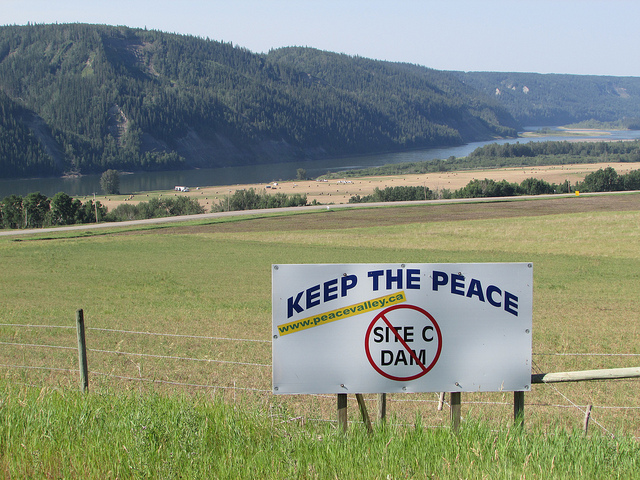Like this article? rabble is reader-supported journalism. Chip in to keep stories like these coming.
Update: The Trudeau government has issued two federal permits for the Site C dam, allowing B.C. Hydro to continue work on the project.
Critics of Site C are not happy citing the environmental destruction of the Peace River area and the outrageous cost of the project at $8.8 billion.
“Site C is an avoidable environmental mess and a failure on the part of this government to shift away from destructive energy projects and towards cleantech, sustainable energy solutions,” said Green Party leader Elizabeth May in a press release.
For three generations, Arlene Boon’s family has farmed in the unique microclimate within the Peace River Region. Now, she and her husband Ken have been told they might be forced to leave their home by Christmas as B.C. Hydro’s controversial Site C developments progress.
“[Site C] is going to take away part or all of our livelihoods,” Ken Boon, President of the Peace Valley Landowner Association told rabble. “We don’t know what we’re going to do yet. Where would we move to replace what we have?”
This push to develop the area’s highways and infrastructure to prepare for Site C is happening despite the fact that several federal permits are still required. The Boon family isn’t the only one that might lose its home as early as December.
“For all the landowners that are in danger of losing their homes, there’s a very real possibility that we could lose our home and our property and then this project could still get shut down,” said Boon. “Arlene and I have been questioning the timeline for why they feel they need to buy us out by this Christmas and start building a road next year.”
Despite this rapidly progressing timeline, Boon says that the federal government shouldn’t issue permits if it’s not what is best for the public.
“If it’s not in the public interest or is going against First Nations treaty rights or any reasons like that, this federal government should feel no obligation to issue a permit,” he said. “In fact, the opposite is true — it’s their obligation not to issue permits if it’s in the best interest.”
A recent poll by Abacus Data shows the 73 per cent of people polled support Site C or can support it under circumstances. However, some have suggested the questions were misleading and the stats neglect that opposition to Site C has doubled since 2013.
It’s these required federal permits that activist groups fighting against Site C are focusing on in recent campaigns. For example, Leadnow is circulating a petition to the federal government and is encouraging Canadians to call upon federal ministers to reject permits.
Along with loss of productive farmlands and dismissal of Indigenous treaty rights, Amara Possian, Campaign Manager at Leadnow, told rabble that there are economic concerns that affect all British Columbians, not just farmers in the region.
“We’re worried about the economic side of things,” she said. “There’s the issue that B.C. doesn’t even need the energy that Site C is going to produce and hydro bills will be going up.”
Andrea Morison, Coordinator of the Peace Valley Environment Association, one of the organizations that helps run the annual Paddle for the Peace event, echoed these economic concerns, pointing to B.C. Hydro’s projected deficit and its potential inability to recoup the loss.
“B.C. Hydro itself has stated…that it will operate at a loss of $800 million for the first four years of operation,” she told rabble. “There’s a lot of concern around the demand for this power and the cost for this power.”
This argument isn’t new, and is one that Adrian Dix, NDP critic for B.C. Hydro has been very vocal about.
“B.C. Hydro and the provincial Liberal government are playing a reckless game with British Columbians. They are building the Site C dam even though it is apparent that we do not need the power. The consequences will include lost jobs, higher electricity rates and long-term damage to B.C. Hydro and provincial finances,” he wrote in a DeSmog article.
“We are going to be paying for Site C for about 70 years, and we have locked ourselves into a very old technology. Our current dams are paid for and will always be competitive for that reason, but not Site C. It is like entering into a 70-year contract for a flip phone at exactly the wrong time. In fact, would you sign any high cost 70-year deal for your hand-held device when prices are dropping?”
With these compounding concerns, activists are not keeping quiet. Leadnow’s petition continues to circulate and nearly 400 protestors took the water at the 11th annual Paddle for the Peace to fight against Site C’s development in the area on July 9. Like Leadnow, Morison said the Peace Valley Environment Association and the Paddle for the Peace’s focus is on the federal government.
“Right now the big push is on the federal government,” she said. “We’re hopeful that with this new, federal Liberal government that they will not simply rely on the bad decision making of the previous Conservative government and that they’ll take a look and appreciate the fact that there are significant concerns.”
Alyse Kotyk is a Vancouver-based writer and editor with a passion for social justice and storytelling. She studied English Literature and Global Development at Queen’s University and is excited by media that digs deep, asks questions and shares narratives. Alyse was the Editor of Servants Quarters and has written for the Queen’s News Centre, Quietly Media and the Vancouver Observer. She was rabble’s 2015-16 news intern.
Photo: flickr/DeSmogCanada



